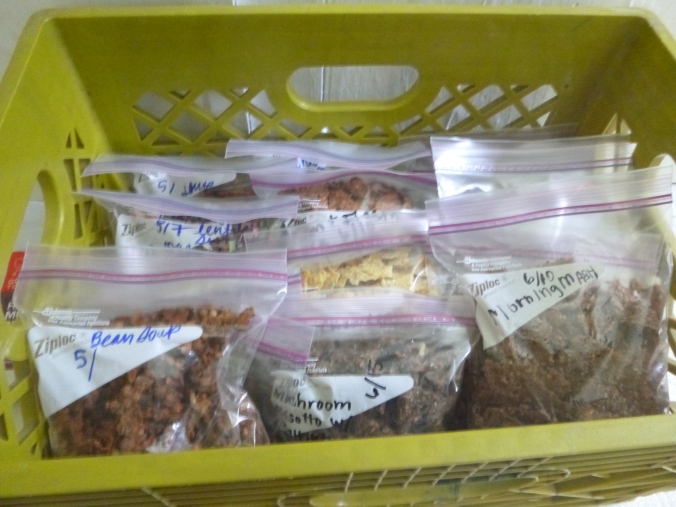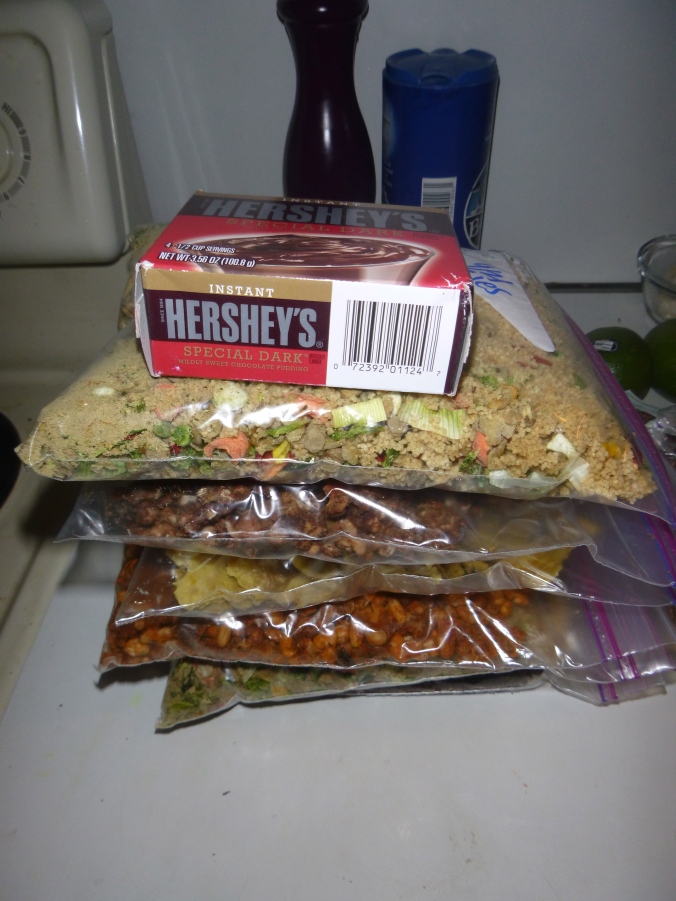Ok first, all y’all should also go read the other half of Snail Patrol’s blog while we’re on the topic: Busy Walking because hiking IS an Awful lot of fun. Now, Let’s discuss the things that the Long Trail encouraged refining. That leaky drom bag is not coming along, for the record.
Shoes: Backpacking boots are heavy, and it’s not like they prevented me from spraining my ankle anyway (not on the LT). Other folks with questionable ankles have advocated low hikers/trail runners because it makes your ankles work harder, thus strengthening the whole thing. No waterproof for this guy, either, because if waterproof shoes/boots get wet on the inside, they never dry. And then they give you wicked blisters with their dampness. Rumor has it we’ll be looking at some stream crossings that you’d want shoes on for. Unless the drought is preventing that altogether.
Pack: Keeping the same pack, which might be a little bigger than I *need* but at least I won’t be wondering if a bear canister will fit in it. I’ll just try to keep it light.
Stove: Sorry, whisperlite, it has been real, but at 11 oz, can’t totally justify it. So we’re going canister this time.
Water: Still going with Aquamira because crumbs build character but viruses do not. Also I thought the Aquamira droppers were less breakable than a filter, but then the bottles apparently can crack and leak everywhere. I’ve never had that happen to mine, but it CAN happen. So I’ll probably bring some tablet backup for overnight water purification, because those take longer anyway. Also got a 3.0 L water bladder to not carry nalgenes. Nalgenes are apparently for amateurs because they weigh 6.2 oz each (the 1L ones). Water bladders are also apparently for amateurs, according to the people that advocate using soda bottles. I think 3.0 L of water per 3.8 oz of water bladder weight is still a serious upgrade. And anyway, if a 1 L soda bottle is about an ounce anyway, we all win on capacity.
Clothes: In the interest of not bringing too many clothes, I’m going to wear my dorky convertible pants in beige. However, I have upgraded to a merino wool t-shirt, because polypro is my stink-nemesis. Normally in the backcountry you just go about your business oblivious to your own stink, but the damn polypro makes itself known. At least natural fibers stink exactly as much as I do, no more. Obviously cotton is not an option. I’m going to bring a giant hat because sunscreen is disgusting (can you imagine using sunscreen and then not showering for multiple days? Gross.) but I’ve heard that high altitude is excellent for sunburns. Rainwear: considering the rainskirt option, got a lightweight rain jacket because the rain jacket I had on the LT wasn’t really waterproof anymore, thus ruining the purpose of having it in the first place.
Sleeping gear: Big thanks to my NOLS friend for lending me a super light down bag and pad. I had cut my foam sleeping pad in half earlier this spring and figured I’d just use that, but then he offered the sweet sleeping pad too. I think he’s leading big awesome alpine trips this summer. Other advice from the helpful former NOLS employee included making sure to hit The Mobil in Lee Vining. Apparently their fish tacos are Ah-Mazing. I will think about those tacos when I’m eating this dehydrated multi-bean soup.
Book?: Probably not, because the book I brought on the LT lasted about 4 days until I could hand it off in the first town. The Joke Book, on the other hand, was totally worth the weight. Maybe I’ll bring it or just study hard so that I have good jokes to tell other people in camp, especially when they’d prefer comparing pack weight. Oh, your pack is 50 lbs because you are carrying video equipment? Well, did you hear about the two muffins in the oven? One muffin said, “Man, it’s hot in here” and the other muffin turns to him and says “Holy shit! A talking muffin!” I’ll bring tiny notebook(s) instead to entertain myself. Plus, there are huge advantages to just spacing out. We might get to see good stars!
The best part about the LT is that it was in my backyard, and a person really could just GO, with or without perfect gear. So just going, sans big planning, had a lot to recommend. Now that we got those JMT permits back in January and getting to the trail is a big production for both of us, you can sort of justify the planning and thinking about how much my damn rain jacket weighs. I don’t regret anything about freestyle backpacking, though. That was awesome in its own way, because you just had to show up and you really don’t need fancy gear to get outside. So now we’re doing a bit more planning and refining, but if nothing else, the LT was excellent for half-assed “planning” and just taking the stuff you already have.
Now, go watch Yosemite HD II because it explains everything.

